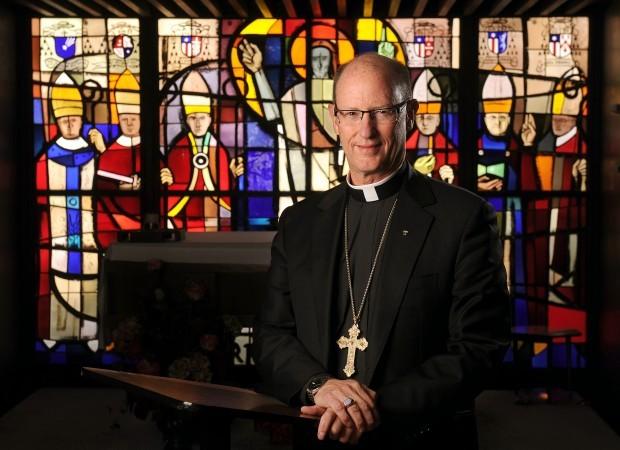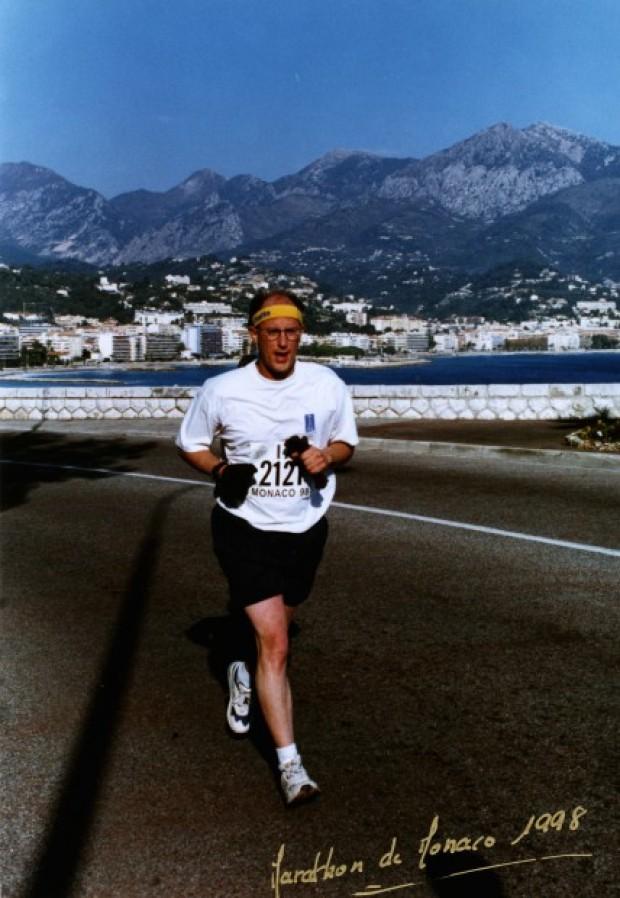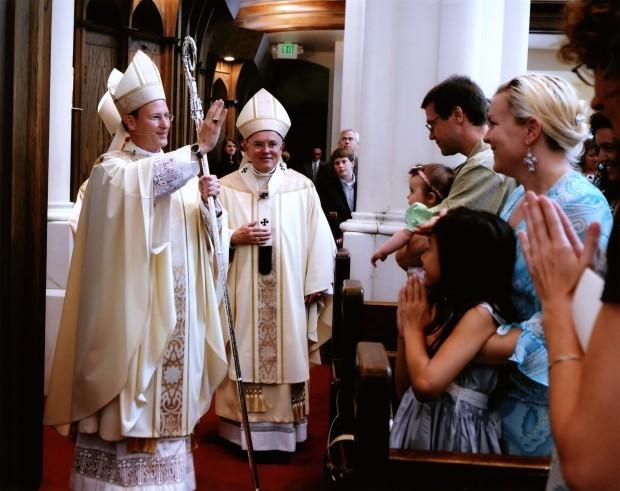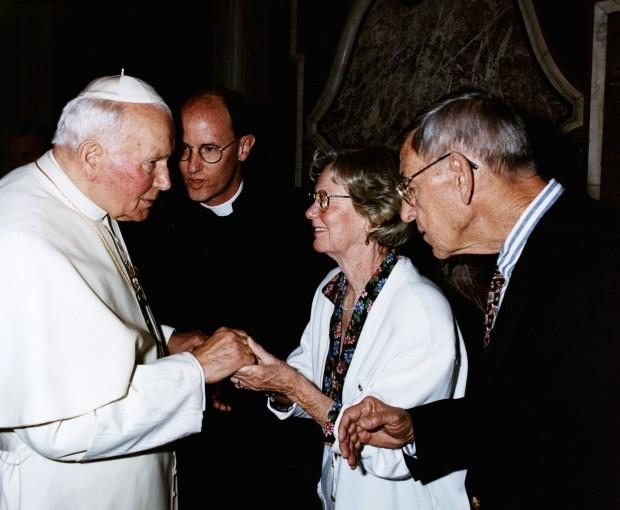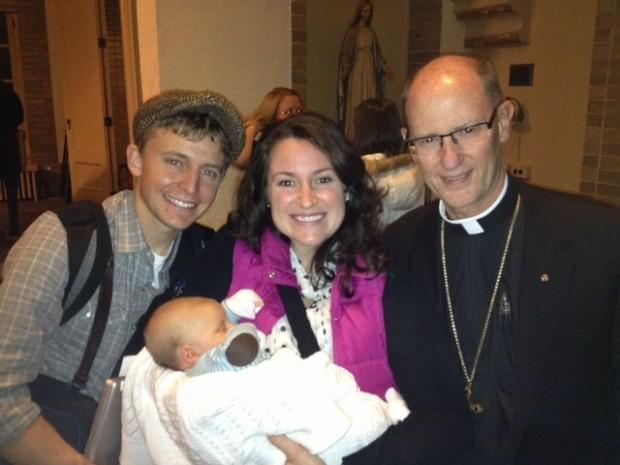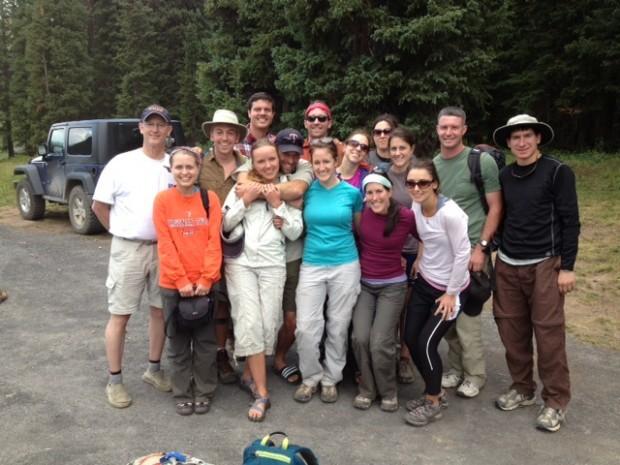Meet the New Bishop of Lincoln's Catholic Diocese: James D. Conley
By By Erin Andersen
Bishop James D. Conley has 2,413 friends on Facebook. His Twitter profile sports a picture of Herbie Husker with a Jayhawk head. Clearly, the new leader of Lincoln’s Catholic diocese is not your average cleric. But when it comes to his faith, make no mistake, Bishop Conley is a man of firm conviction and religious principles. Conley, the ninth bishop to lead Lincoln’s 125-year-old diocese, officially took the helm on Nov. 7 -- the morning after the re-election of President Barack Obama. Conley will be installed formally at 2 p.m. Nov. 20 in a ceremony at Cathedral of the Risen Christ Church. To date, 38 bishops from around the country have RSVPed to attend. Conley, 57, replaces retiring Bishop Fabian Bruskewitz, who led the diocese for 20 years. *** Whereas Bruskewitz grew up immersed in the Catholic faith, Conley grew up Presbyterian. “I was basically a happy pagan -- indifferent to God and religion,” he said this past September when his appointment to the Lincoln diocese was first announced. Conley converted to Catholicism halfway through his junior year at the University of Kansas. He was 20. “I read my way into the Catholic Church,” Conley said, referring to the university’s integrated humanities program in which he read all the classical great books. Year two of the program was dedicated to reading the works of Christian authors. Conley said there he found “truth, goodness and beauty” through the literature, music and art of Catholics, and he came to embrace the Catholic Church. At first, his surprised parents thought it was just a fad. “But they quickly realized it was a serious decision I had made,” Conley said. And years later, his parents converted to Catholicism. Conley, himself, baptized them in 1991 -- by that time he had been a priest for six years. But Conley said when he converted to Catholicism, he never considered entering the priesthood. Then in 1979, a 24-year-old Conley joined his friends on a road trip to Des Moines, Iowa, where Pope John Paul II was leading a Mass. “At that Mass, it was the first time I thought God might be calling me to be a priest,” he said. Three months later, Conley started seminary. In May 1985, he was ordained in the Diocese of Wichita, Kan. “Ironically, I was in seminary with a number of Lincoln seminarians,” Conley said. Now, after 25 years, he is reunited with many former classmates who are priests in Lincoln. His pastoral career has taken him around the world, serving parishes in Wichita, Kan., as well as Catholic students enrolled at American universities. He also was director of Respect for Life ministries, a theology instructor, a Vatican official, and ultimately, a bishop upon his 2008 ordination and appointment as auxiliary bishop to the Archdiocese of Denver. When the archdiocese bishop was appointed to lead the Philadelphia diocese, Conley became apostolic administrator of the Denver Archdiocese. Reflecting on those 10 months as interim leader, Conley said it prepared him to step into a diocese of his own. But the Lincoln diocese is rather unique. “Bishop Bruskewitz is a very strong leader, and I have admired that,” Conley said. “He has led the Diocese of Lincoln with great vision and clear teaching," he said, noting that its schools, health care system and religious vocational programs all are growing and strong. "I want to continue the great legacy that I have been given," Conley said. What is noticeably different between the two bishops is their style. Bruskewitz has always been clear, concise, direct and unyielding in his orthodoxy. He can seem a foreboding figure -- especially when crossed. He always has been resolute in his convictions and commitment to Catholic education and health care. And Bruskewitz is proudly ultra-conservative in his views of God’s word and the expectations of the Catholic Church. Those principles have earned Lincoln the reputation as the nation's most conservative diocese. It is the only diocese in the country not to allow girl altar servers. And it is the only diocese not participating in annual sex abuse audits instituted by the U.S. Conference of Catholic Bishops to address the issue of sexual abuse by clergy. “I don’t like the terms conservative and liberal,” Conley said. “It has so many connotations and mostly political. “I consider myself first of all Catholic. To be truly authentic Catholic and faithful to the mind of the church is my goal. If it is considered conservative by some, so be it,” he said. “Being a convert to the Catholic faith, like any convert who comes late -- I am in love with the traditions of Catholicism, the rituals of our Catholic heritage. But I am open, too. As Jesus says, ‘Seek the truth, and the truth will set us free.’ I am open to anything that is true and willing to listen and consider ideas and truths that people bring.” Conley’s stature and style are a sharp contrast to Bruskewitz's. He comes across as an everyday kind of guy; an avid hiker, biker and runner, he has accompanied college students and parishioners on treks into the Colorado mountains. He has completed six marathons -- including races in Monaco and Paris. “There still may be a couple more left in me,” he said with a grin. Soft-spoken and affable, he pages through photo albums, joking about his 1970s long hair; pointing to himself and his boyhood friend Paul Coakley, now archbishop of the Archdiocese of Oklahoma City, back when they were baseball teammates; and talking fondly about his families -- the one he grew up with and those of the church. His time in the Archdiocese of Denver has taught him about finding new common ground. “The church changed and compromised in an effort to flourish in a liberal and progressive environment,” Conley said of the Denver archdiocese. “I can bring that experience … to be a voice in the larger culture, particularly with life issues -- marriage and family life and the fight for religious liberty.” But make no mistake about it, Conley is unwavering in his conviction that some issues are non-negotiable. He sees the president’s national health care program “a real threat” to the Catholic Church’s work in society. “With the president being re-elected, we are going to have to continue the battle for religious freedom and protection of our rights,” Conley said. Conley said the church cannot compromise when it comes to abortion, contraception and sterilization. “We cannot compromise the issues that are intrinsic to who we are,” he said. He sees America at a pivotal point in history. “We have to look at ourselves. Who are we? Who do we want to be in America? What kind of country do we want to be,” he said. As for the Diocese of Lincoln, Conley sees a welcoming home for Catholics and converts of all ages and races -- particularly Catholic college students and the Hispanic community. In Denver, where 51 percent of the Catholics are Hispanic, he worked closely with parishioners on immigrant issues. “I spent six weeks in Guadalajara, Mexico, studying Spanish to get rid of my Italian accent,” he said. He’s also eager to begin traveling to the 138 churches in the 23,844 square miles that make up the diocese. “Within six months, I hope to have met a large part of the Diocese of Lincoln, along with the priests that are serving it,” Conley said. In the meantime, parishioners can always follow him -- on Twitter and Facebook. “Pope Benedict has ... asked us as priests and bishops to use every means available to us to communicate the gospel for a lot of people. New digital media is the way they receive that information. We have to be there,” Conley said. “But (digital media) is a means to an end -- not an end in itself. There is no substitute for personal encounters and one-on-one evangelism.”
|
.
Any original material on these pages is copyright © BishopAccountability.org 2004. Reproduce freely with attribution.
